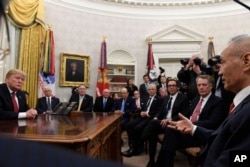A new report from U.N. Conference on Trade and Development warns the U.S.-China trade wars will negatively impact international trade, with the two economic superpowers emerging among the biggest losers.
U.S.-China trade discussions are underway. If no agreement is reached by March 1, tariffs on $200 billion in Chinese goods will increase from 10 percent to 25 percent. A new UNCTAD study warns the repercussions on international trade will be massive, leading to a downturn in the global economy and instability in commodities and financial markets.
Pamela Coke-Hamilton, director of UNCTAD's Division on International Trade in Goods and Services, and Commodities, said small — and lower — income countries will suffer, as their exposure to external shocks will make it very difficult for them to maintain any level of resilience.
“Stagflation leading to job losses and higher unemployment and more importantly, the possibility of a contagion effect, or what we call a reactionary effect, leading to a cascade of other trade distortionary measures because everybody then will get in the game, and it will be very difficult,” Coke-Hamilton said.
The study predicts higher tariffs will trigger currency wars and devaluation. It warns the impact on global value chains and intermediate suppliers will be devastating. For example, the U.N. report says the relocation from East Asian value chains will result in a reduction of almost $160 billion to the region.
Coke-Hamilton said the retaliatory tariffs imposed by the United States have not achieved their intended effect. She says they have not resulted in increased domestic production, but rather will lead to a diversion of trade to third countries.
"If the tariffs rise to 25 percent,” Coke-Hamilton said. “What will occur is simple — they will limit trade from China. However, it will not be effective in protecting domestic firms. So, suppliers in the rest of the world will be more competitive. Trade diversion affects in favor of third countries."
U.N. economists said the European Union will emerge as the biggest winner, capturing about $70 billion of U.S.-China bilateral trade. They said Japan, Mexico and Canada will each capture more than $20 billion.









